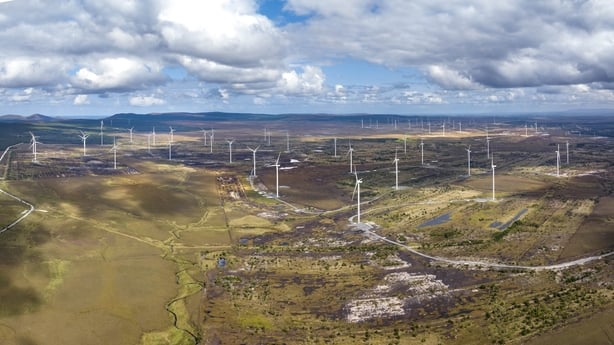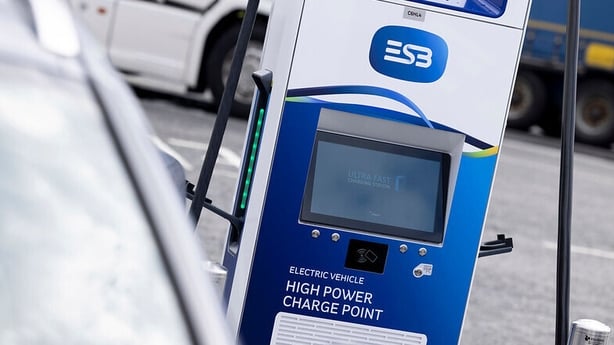ESB Group has reported a 30% increase in its group operating profits for the six months to the end of June after what it called a period of continued uncertainty and change for the energy industry.
The group's half year group operating profit rose by €157m to €676m, while revenues rose to €4.903 billion from €3.678 billion.
The company said it invested a total of €779m of capital expenditure in critical infrastructure in the six month period, a 49% increase on the level of investment the same time last year.
ESB said the increased profits mainly related to its operations in the UK, with higher energy margin earned in its GB Generation and Trading business and improved performance in its GB energy supply business.
Revenue in the ESB Networks division rose as a result of regulated network tariff changes, and ESB noted that it also benefitted from foreign exchange movements.
But these positive movements were partially offset by lower Electric Ireland profitability for this six-month period compared to the first half of 2022, the company added.
Paul Stapleton, ESB's Chief Financial Officer, said the company fully understands that people find it difficult to comprehend energy company profits at a time when prices for families and businesses remain high.
He explained that as ESB's generation and supply businesses are required to operate separately, the company can not use profits from ESB's generation business to offset Electric Ireland's prices.
"However, we remain committed, as we have been throughout the energy crisis, to supporting our customers in so far as we can. It remains crucial that ESB continues to earn sufficient profits to allow us to support the increased investment required to deliver a future powered by clean electricity," he added.
We need your consent to load this rte-player contentWe use rte-player to manage extra content that can set cookies on your device and collect data about your activity. Please review their details and accept them to load the content.Manage Preferences
He said the company recognises the ongoing challenges posed by high energy prices for its customers.
But he added that the levels of volatility in global energy markets experienced in 2022 eased somewhat in the first half of 2023.
He noted that market conditions have been relatively more stable in the first six months of this year, with wholesale prices reduced from the peaks of 2022, but they remain significantly higher than pre-energy crisis levels.
"If this downward trend in wholesale prices continues, customers should progressively see the benefit reflected in lower energy prices," he said.
Electric Ireland, along with other energy companies, recently announced reductions of 10% for electricity and 12% for gas for its 1.1 million residential customers in Ireland.
In today's results statement, ESB said it is investing heavily in the development of new wind and solar generation and significantly increased the amount of renewable generation connected to Ireland's electricity networks.

It said it has ambitious plans to help meet the country's growing renewable energy needs, particularly in offshore wind and complementary green hydrogen projects.
Much of this is being progressed through partnerships with global players in the renewables sector, with potential for investment of over €20 billion between now and 2040.
"ESB Networks, through its Networks for Net Zero strategy, plans to invest €10 billion in a more flexible and smarter electricity network out to 2030," it stated today.
ESB said it paid about €1.5 billion in dividends to the State over the past decade, including a €317m dividend from 2022 profits.
Dividends from 2023 profits will be considered at the end of the financial year, it added.

ESB Group is organised into five reportable divisions which are managed separately - ESB Networks, Northern Ireland Electricity Networks, its UK Generation and Trading division, Customer Solutions - which includes Electric Ireland - and its Engineering and Major Projects division.
The ESB Network divison saw its operating profits rise by 40% to €157m mainly due to higher regulated income.
Operating profits at its NIE Networks division rose by €2m to €10m, while operating profits at its UK Generation and Trading divison increased by €185m to €494m.
ESB said its Customer Solutions' operating profits came to €23m compared to a loss of €45m the same time last year.
It said the return to profit was mainly driven by greatly improved performance in its So Energy (GB) business with the business close to breakeven in operating profit terms
But it added that Electric Ireland's profitability for the first six months of the year was lower than 2022 driven by higher hedged wholesale energy costs.
Meanwhile, its Engineering and Major Projects, Corporate Centre and Enterprise Services division, which includes most of the financing costs of the group, reported an operating loss of €8m for the first half of the year compared to a loss of €33m the same time last year.
Speaking in New York, Minister for the Environment, Climate, Communications and Environment, Eamon Ryan, said some of the profits will come back to the State in the form of dividends.
He also pointed to legislation, which the Government is due to bring through the Oireachtas shortly, which will allow the State to tax windfall profits from energy companies.
ESB profits boosted by increased network tariffs
Dr Muireann Lynch, Energy Economist with the ESRI, said today that the ESB's networks division and its businesses in the UK have experienced a large increase in profits.
Speaking on RTÉ's News At One, she said the reason the ESB's networks division - which owns all of the wires that are used to transport electricity around the country - have seen an increase in profits is because there has been a change to the network tariffs.
"Those network tariffs are not set by ESB themselves, they are set by the regulator in line with Government policy," she explained.
In terms of the profits posted in its UK business, she said there is a very different trading environment there and most energy companies in the UK at present are seeing an increase in profitability.
Dr Lynch also said there is a very good reason for restricting companies like ESB from passing profits in one division onto another division.
"The reason for that is because ESB owns the network and ESB have an advantage compared to all of the other energy companies in the country," she said.
She said a lot of research has been conducted on this which shows that if companies like ESB were allowed to pass profits from one arm to another, it proves to be "really bad" for the consumer in the long run and the consumer ends up paying higher bills.
She said while all energy providers are making profits at present, the Government has responded and has introduced a windfall tax which is going to scoop up profits on the wholesale side.
The wholesale side is where the generators sell their energy. She said there have are problems with how the wholesale markets have been designed for a long time, and the windfall tax is going to address that to some extent.
She said that the regulator and policy makers need to keep an eye on profits in the energy sector when they start to become "medium run or long run".

